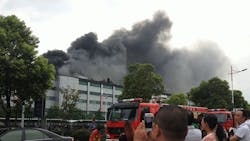World Chip Supply Chain Rattled by China Fire
SHANGHAI -- A fire at a giant Chinese factory making almost one sixth of the world's supply of a key high-tech component shows how vulnerable global manufacturing chains can be to an unexpected event, analysts say.
The vast SK Hynix (IW 1000 491) facility in Wuxi city produces dynamic random access memory (DRAM) chips, used to store data in personal computers and mobile devices such as smartphones and tablets.
The South Korean firm is the world's second largest manufacturer of DRAM chips, and says it has a 30% market share, with the factory in eastern China accounting for half its output.
Hynix -- whose customers include smartphone giants such as Samsung and Apple, which has just introduced two new iPhones -- has only one other facility producing DRAM chips, in South Korea.
Partial production in Wuxi resumed three days after the September 4 blaze, which was reportedly caused by a gas leak, but a spokesman at the company's headquarters said: "It's still too early to give the estimate of the damage and to predict when full operations may resume."
Analysts say such supply chain shocks can push up prices and potentially delay shipments for finished products.
"As global smartphone shipments are at a high level...supplies (of memory chips) are sought-after," said Wang Jun, of consultancy Analysys International.
"Hynix is in a relatively advanced position in the global memory chip market, so even a single incident at one plant will have a domino effect."
Chip values spiked after the fire and are expected to remain buoyant, according to analysts.
"Memory chip prices surged mainly because of expectations" of short supply, said Kevin Wang, director of China services at market research firm IHS iSuppli. "Prices will likely remain on an upward trend towards year-end."
A huge shortage of memory chips was unlikely in the next two months because of high inventories, he added, but the longer-term impact would depend on how soon Hynix could resume full production, which could take up to four to six months.
In July Hynix posted record second quarter profits on the back of robust chip demand and strong semiconductor prices. Its operating profit for April-June jumped to 1.1 trillion won (US$1.0 billion), a sharp increase from 5 billion won a year earlier.
No smartphone producers are known to have announced delays yet due to the fire, but analysts said it would inevitably have some impact.
"Mobile phone producers related to Hynix will surely be affected, but shipments will gradually stabilize as other suppliers in the global supply chain will come in and fill the gap," said Wang Jun.
Global shipments of smartphones jumped 52.3% annually to 237.9 million units in the second quarter this year, the strongest growth in more than a year, according to market intelligence firm International Data Corporation (IDC).
IDC has forecast 40% annual growth in worldwide smartphone shipments to over one billion units this year. But such explosive growth assumes other suppliers can meet demand for DRAM chips to fill the gap left by the Hynix fire, analysts said.
-Amanda Wang, AFP
Copyright Agence France-Presse, 2013
About the Author
Agence France-Presse
Copyright Agence France-Presse, 2002-2025. AFP text, photos, graphics and logos shall not be reproduced, published, broadcast, rewritten for broadcast or publication or redistributed directly or indirectly in any medium. AFP shall not be held liable for any delays, inaccuracies, errors or omissions in any AFP content, or for any actions taken in consequence.
